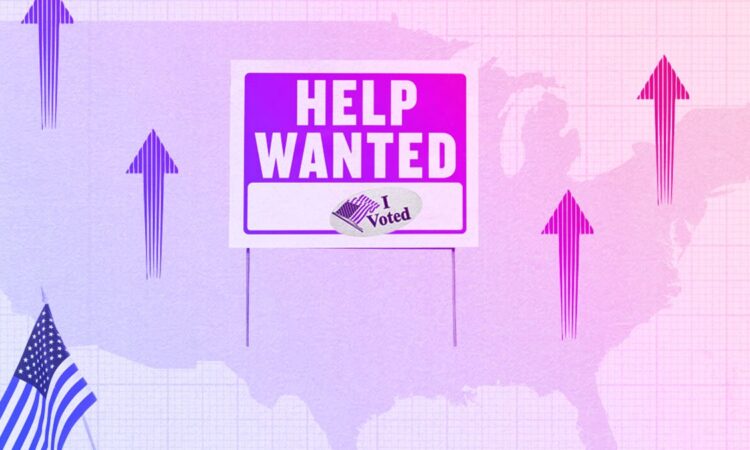
PEACH BOTTOM, Pa. – This picturesque village in Lancaster County, Pennsylvania, is nearly 2,000 miles from the country’s southern border.
But at Graywood Farms in the heart of Amish country, farmer and co-owner Lisa Graybill warns of a pressing immigration issue that she and other farmers say is not getting enough attention: they need migrant workers to keep their farms running and Americans fed.
“This is extremely urgent,” Graybill said. “Without immigrant labor, our dairy farm wouldn’t be here.”
She and other Pennsylvania farmers say they want Congress to stop attacking each other over immigration and pass reform that will give year-round growers and producers – which describes most farms – access to the H2-A farmworker program used by seasonal growers and producers. The visa program would ease the worker shortage in the agriculture industry.
A seasonal visa isn’t enough at a farm like Graybill’s, where she said it takes two months just to teach someone how to properly milk cows.
“We need long-term workers here. We need workers year-round,” she said, adding that a three- or five-year program would be more appropriate.
Many farm owners want the U.S. Senate to pass the Farm Workforce Modernization Act that passed the House twice, including with support from 40 Republicans. They have been working with Sens. Mike Crapo, R-Idaho, and Michael Bennet, D-Colo., and feel the window is closing to get it passed.
Immigration reform is something we’ve been working on for decades, and lawmakers keep kicking the can down the road. … The system is broken. … Can we at least get an immigration bill for the ag sector so we can have food security?
“We’re really desperate at this point,” said Bailey Thumm, federal affairs specialist at the Pennsylvania Farm Bureau. “This is not just about farmers and ranchers. It extends to consumers and every constituent.”
Farmers are counting on a lame-duck Congress to get it done after the election and before a new Congress is sworn-in in January.
“Immigration reform is something we’ve been working on for decades, and lawmakers keep kicking the can down the road,” Graybill said. “We’re obviously not getting comprehensive reform. The system is broken. We can’t get that. Can we at least get an immigration bill for the ag sector so we can have food security?”

Immigration is on the ballot in Pennsylvania and the other dozen or so battleground states where control of Congress will be decided.
But it’s not so much about seasonal visas or labor shortages. Mostly, it’s about the U.S.-Mexico border where a record number of migrant crossings this year – nearly 2.4 million – has only intensified the political rancor over immigration.
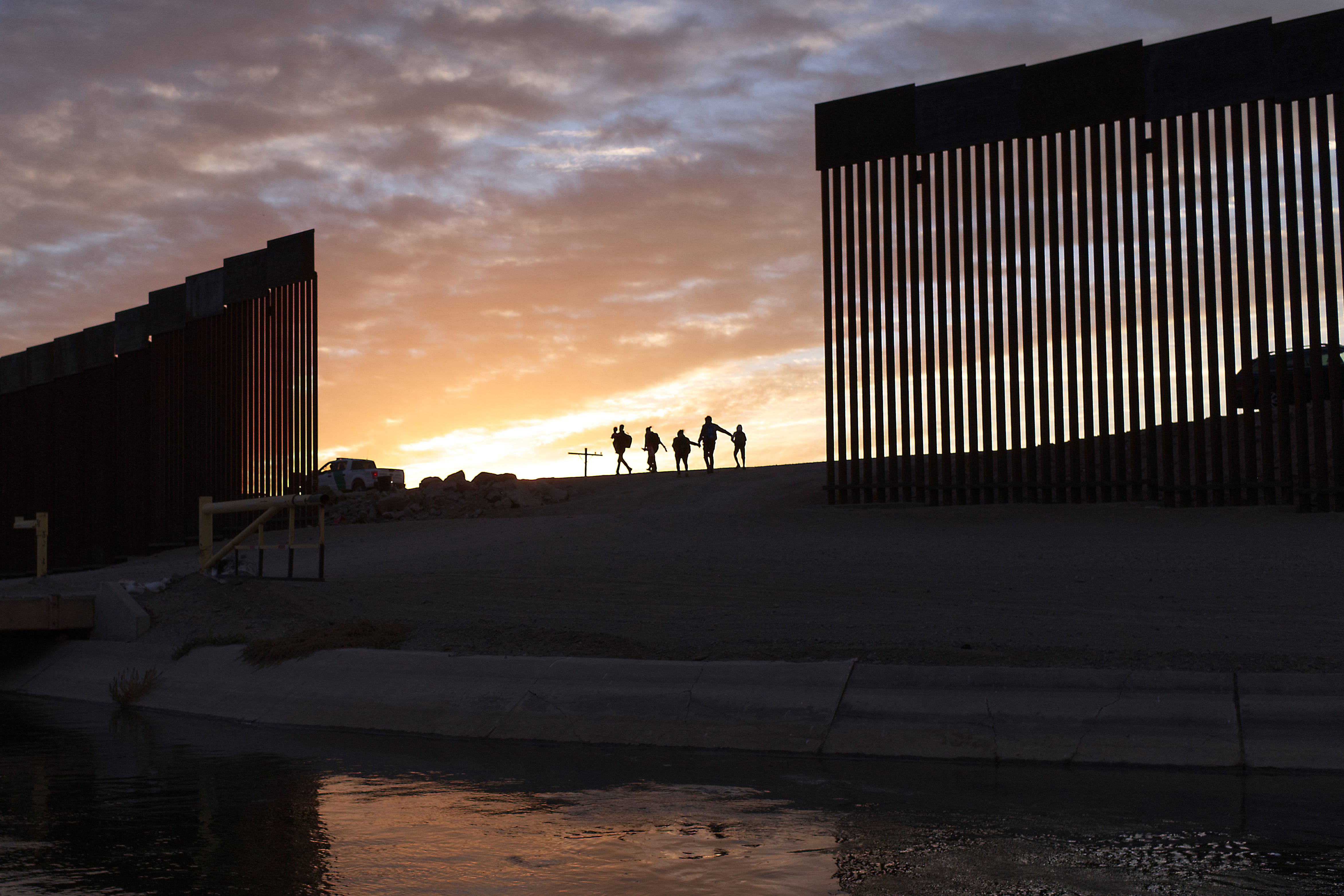
Eugene Garcia, AP
It’s a top talking point for Republican candidates on the campaign trail who push the potential dangers and social service costs to Americans from record border crossings and call for tougher immigration policies.
Democrats generally take a softer approach: backing a secure border but without harsh enforcement while advocating for the protection of certain migrant groups, such as “dreamers” brought over illegally as children years ago.
Much of that nuance has been lost in the wash of political messaging.
Not long ago, immigration was not the polarizing issue it is today, said Doris Meissner, a former commissioner with the U.S. Immigration and Naturalization Service.
A bipartisan “gang of eight” senators that included two swing state senators up for election this year – Michael Bennet of Colorado and Marco Rubio of Florida – tried in 2013 to forge a compromise to build more fencing, hire 20,000 additional patrol agents, revamp the nation’s visa program to help employers, and provide a path to citizenship for an estimated 11 million undocumented immigrants.
The bill was approved 68-32, a remarkably decisive outcome in a divided Senate. But it stalled in the GOP-controlled House where tea party conservatives blocked it, labeling it “amnesty.”
Prospects of any compromise changed even more dramatically among Republicans in 2016 when Donald Trump ran on a pledge to build a wall on the southern border, Meissner said.
“Prior to ‘build the wall’ and the Trump presidency, there was for decades a consensus at the top levels broadly of both parties that immigration was a positive or was a plus for the country,” she said.

The immigration debate in the midterms has been insufficient, according to farmers and other business leaders.
“One side is demagoguing on the issue, and one is in denial,” said Rebecca Shi, executive director of the American Business Immigration Coalition Action. “Democrats are sticking their heads in the sand as if there’s no problem, and Republicans are engaging in political theater.”
Meanwhile, she said, American consumers are paying the price at the grocery store.
A workforce shortage in the farming industry has driven higher food costs, along with a supply-chain weakened by the pandemic and war in Ukraine.
Forecasts from the U.S. Department of Agriculture show a food crisis could worsen in 2023 because of a lower domestic supply. Next year will be the first year in U.S. history when the country will import more food than it produces.
“That’s a huge red flag when you rely on other countries for your food,” Graybill said. “That’s a national security issue.”
Shawn Saylor, co-owner of Hillcrest Saylor Dairy Farm in Somerset County in Pennsylvania, said supply will dry up if there aren’t enough workers to produce the product.
The migrant workforce is our workforce.
“It’s been really bad,” he said. “This spring we had no help at all.”
The country needs an immigration program that provides a stable workforce year round, Saylor said.
He and Graybill have both listed farm jobs to try and attract domestic workers. Graybill said she received zero inquiries. Saylor said local help did not show up for work.
“The migrant workforce is our workforce,” he said.
Rubio, Demings spar in Florida Senate debate over topics of inflation, immigration
Republican Senator Marco Rubio and Democrat Congresswoman Val Demings exchanged jabs during the Florida Senate debate as election day gets closer.
Claire Hardwick, USA TODAY

Though farmers in Pennsylvania said they weren’t backing a particular candidate because of immigration, the issue could weigh heavily in Nevada, a state that relies on immigrant labor and where incumbent Sen. Catherine Cortez Masto is trying to hold onto her seat in a race that could determine control of the chamber.
Immigrants make up 19% of Nevada’s population and 25% of its labor force, according to a December report from the advocacy group National Immigration Forum. As for the hospitality industry, the backbone of Southern Nevada’s economy, nearly one-third of employees are immigrants.
“Las Vegas, as we know it, doesn’t work without immigrants,” said Michael Kagan, a law professor at the University of Las Vegas, Nevada with expertise in immigration law. “When tourists come to Vegas, they often forget that it takes more than 2 million people to make this place work.”
But immigration falls far below other pressing issues like the economy.
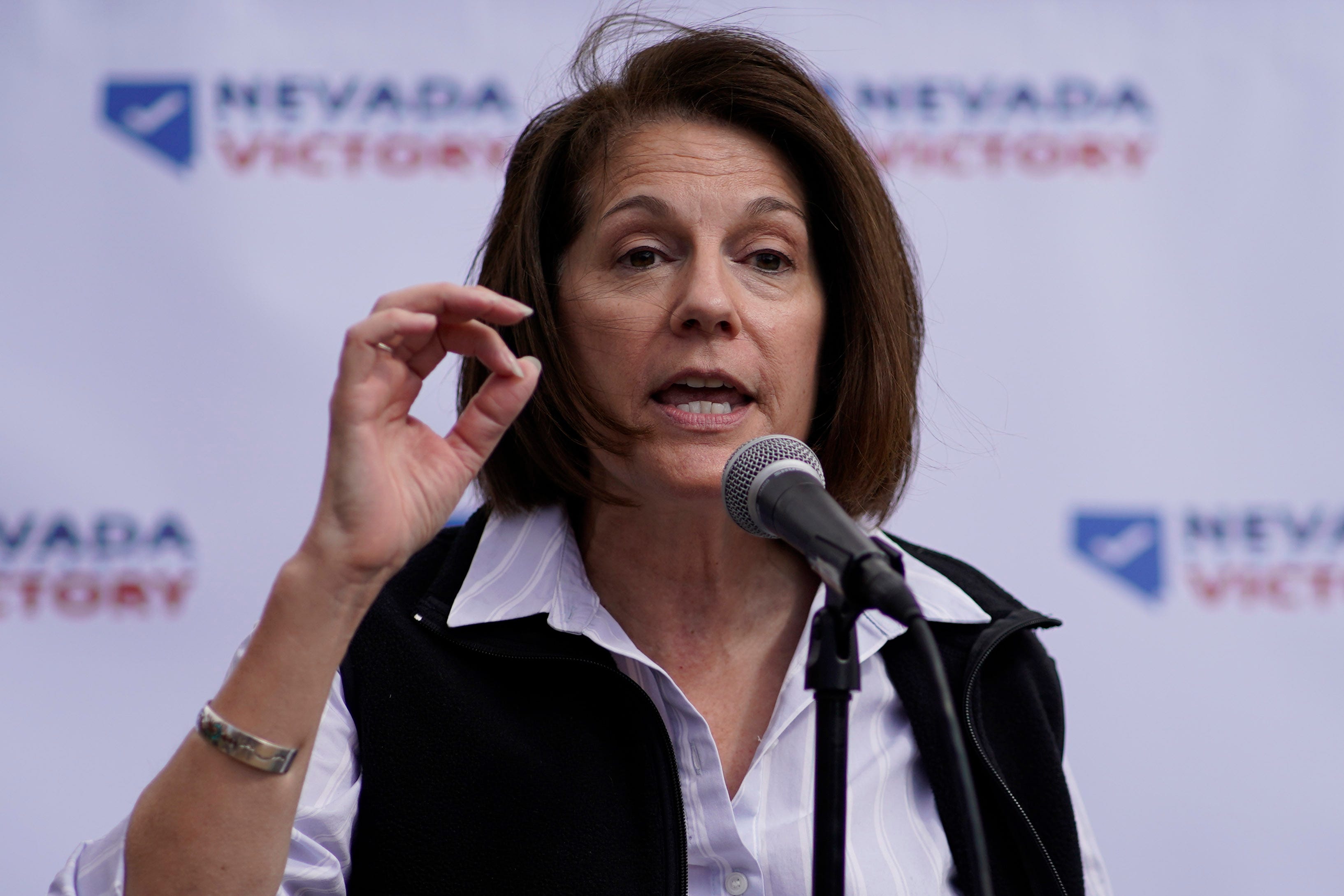
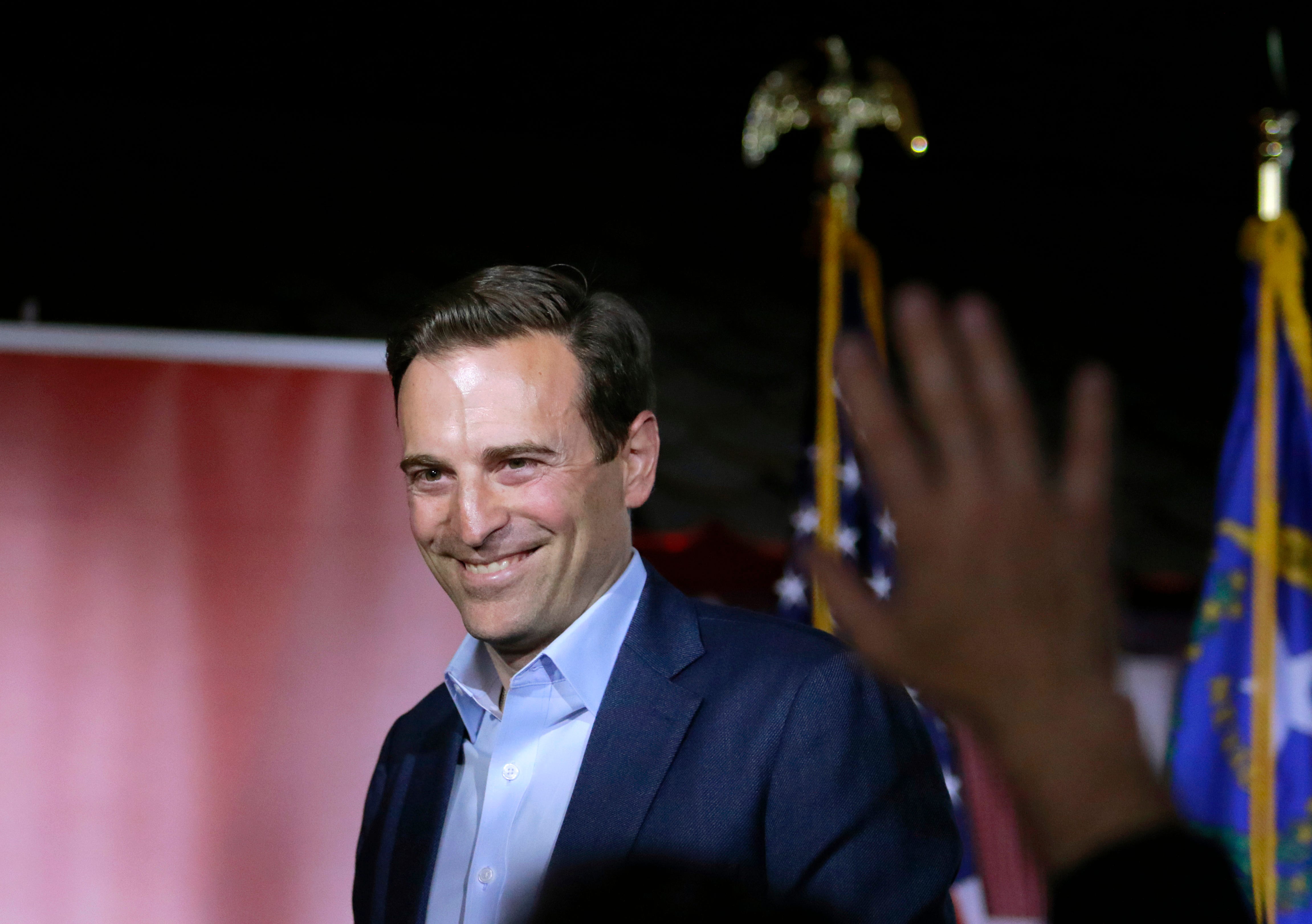
Sen. Catherine Cortez Masto, D-Nev., is running against Republican candidate Adam Laxalt.
Sen. Catherine Cortez Masto, D-Nev., is running against Republican candidate Adam Laxalt.
JOHN LOCHER, AP; RONDA CHURCHILL, GETTY IMAGES
With inflation rates still high and concerns over a recession increasing, Nevada’s Senate race is shaping up to be one of the tightest in the country, with Cortez Masto toe-to-toe in the polls with Republican Adam Laxalt.
The candidates differ on many issues, including immigration. Laxalt said curbing illegal immigration is a top priority and promises to work at finishing the wall if elected. He has also spent thousands on ads on his opposition to protections for dreamers, or undocumented immigrants who were brought to the country as children, per Axios.
Meanwhile, Cortez Masto is co-sponsor of the DREAM Act – a proposal to provide a pathway to citizenship for dreamers – and said she is “a fervent” supporter of comprehensive immigration reform.
But even as the nation’s first Latina senator (her father’s parents were Mexican immigrants), experts say Cortez Masto can’t rely on the immigrant and Latino vote in the midterms. Laxalt’s team has ramped up Spanish language attack ads and launched a “Latinos for Laxalt” coalition.
“Demographics is not destiny,” said Andrew Lim, director of research for the American Immigration Council, a nonprofit that advocates for immigrants. “Just because someone is Hispanic or Asian, (doesn’t mean) they’re going to vote a certain way.”

Elizabeth De La Cruz, a University of Nevada, Las Vegas, student, said she was still deciding between Cortez and Laxalt.
The daughter of two immigrants from Mexico who were undocumented most of her life, De La Cruz said she’s shopping around for candidates and plans to vote for a mix of Democrats and Republicans in the midterms.
Elizabeth De La Cruz
As for the Senate race, the 23-year-old said she’s trying to figure out which candidate is the “lesser of two evils.”
She strongly disagrees with Laxalt’s stance on abortion. But she also wishes Cortez Masto was more focused on improving education and mental health resources in Nevada.
For De La Cruz and many other voters in Nevada, immigration falls below other priorities like the economy and inflation.
Anthony Diaz, a Hispanic sales manager at a high-end store on the Las Vegas Strip, said he sides with Democrats on immigration but sees “really great ideas” on both sides.
His parents immigrated from Mexico to the U.S. when they were teenagers and didn’t become citizens until their twenties. His family’s struggles with the immigration system have influenced his ballot decisions, but the economy reigns as the No. 1 issue this year.
“Here in Vegas, our economy is slowly starting to pick back up, which is awesome,” he said. But all the talk around a recession “is a little frightening.”
Edward Ely III
Laxalt’s focus on border security appeals to voters like Edward Ely III, a 41-year-old freelance paralegal in Las Vegas who describes himself as a conservative who has issues with both parties.
Ely also said he’s voting for the “lesser of two evils.” For him, that’s Laxalt, even though he disagrees with Laxalt’s hardline stance against dreamers.
“It’s not because of (Laxalt’s) immigration policy. It’s for a host of things because, again, immigration is not my No. 1 issue right now,” Ely said, adding that his focus this election is more on the economy, healthcare, education and keeping taxes low.
A recent poll from USA TODAY and Suffolk University found Cortez Masto is in a statistical tie with Laxalt: 46%-44%, with nearly half of Hispanics polled naming the economy and inflation as their top priority.

Donnie Oldham, president of Sanford Contractors, a construction company based in North Carolina – another swing state with a key Senate election – is doing something most executives try to avoid – turning down money.
His company, which does site development and helps build bridges and buildings, has about 45 open positions, mainly foremen, pipe layers, equipment operators and truck drivers.
“Too many people have left the workforce. It started during COVID and it has continued,” Oldham, 67, told USA TODAY. “Fortunately, we’re in an area where there’s a lot of work to be done and we have to turn work down.”
Asked if immigration could be a possible answer to worker shortage, Oldham said he was all for “legal immigration.”
“I am 100% opposed to illegal immigration. Our immigration system is ridiculous. Instead of a system that’s based on family, we should have an immigration system based on the needs of the country,” he said. “For more employees, we should look at legal immigration and it just seems to make sense. But I’m just a common sense contractor.”
Oldham said one of his workers, who was in the country legally, had to stop working while the paperwork to renew his visa gets processed. That process has taken 16 months already with no end in sight.
“We should focus on the people that are here legally and get them where they can work instead of spending our time and effort looking after illegals,” he said.
Oldham, a right-leaning independent, said the Biden administration’s policies on immigration don’t make sense.
“They’re not trying to stop illegal immigration, but it’s against the law to hire illegal workers,” he said.
Meissner, the former INS commissioner, said the “business-employer wing” of the GOP, which wanted ready access to workers including foreign-born ones, has been drowned out of Republican politics.
Now a senior fellow at the Migration Policy Institute, a liberal-leaning think tank on immigration policy, she said Republican candidates rarely tell voters how they support legal immigration in their ads or during debates.
“They lump it all together and certainly the impression that they leave is that all of immigration is illegal and is a threat to the country,” she said. “That’s a fundamental, dramatic shift and it has really pushed the business wing and business voice out.”

The U.S. construction industry needs to attract nearly 650,000 additional workers on top of the normal pace of hiring in 2022 to meet the demand for labor, according to a report from the Associated Builders and Contractors.
“The workforce shortage is the most acute challenge facing the construction industry despite sluggish spending growth,” said ABC Chief Economist Anirban Basu. “After accounting for inflation, construction spending has likely fallen over the past 12 months. As outlays from the infrastructure bill increase, construction spending will expand, exacerbating the chasm between supply and demand for labor.”
While the need to reform our nation’s immigration system persists, the Biden administration’s failure to address the record-breaking influx of illegal border crossings into the United States threatens the ability to enact common-sense laws that can support legal immigration into the country.
Michael Bellaman, ABC president and CEO, echoed Oldham’s sentiment.
“While the need to reform our nation’s immigration system persists, the Biden administration’s failure to address the record-breaking influx of illegal border crossings into the United States threatens the ability to enact common-sense laws that can support legal immigration into the country,” Bellaman told USA TODAY. “It shows a lack of urgency and seriousness from the president and his administration and makes a bipartisan deal on this issue largely unattainable.”
Submitted
Mark Stevens, 51, a computer technician from Winston-Salem, North Carolina and an independent, said he’s leaning more toward Republican candidates.
“Republicans have a more practical view towards immigration, whereas Democratic candidates seem to be more, ‘Let’s let everybody in. Let’s give everybody a path to citizenship.’ The Republican candidates seem to be more, ‘We want the people who are willing to work and who are willing to produce and improve our society to be here.”
But George Papas, an immigration attorney in Hendersonville, North Carolina, said Republicans have turned the discourse on immigration into a “if they win, we lose zero sum game.”
“The hostility is reflected in the immigration courts in Atlanta and in Charlotte, where the highest denial rates for asylum prevail,” he told USA TODAY. “They will not be talking about outsourcing workers or about education. The right wing base of the Republican party has used immigration as a political wedge issue to deflect attention and to deflect media, airwaves, and media space from real issues.”
The restrictive legal immigration policies of the Trump era are coming home to roost, he said.
Increasing visa caps would help the situation by addressing worker shortages and easing pressure on the southern border, Pappas said.
“They cannot find farm workers. They cannot find workers for restaurants; they cannot find them for gas stations. The construction industry does not have enough laborers. So here we have a labor crunch, not only in North Carolina, but throughout country,” he said. “And what happens if you can’t find workers? Companies will go out of business.”
Asked to assess the crisis at the U.S.-Mexico border during an October debate, North Carolina Democratic Senate candidate Cheri Beasley didn’t spare her own party.
“You know, Washington has dropped the ball on immigration,” she said.
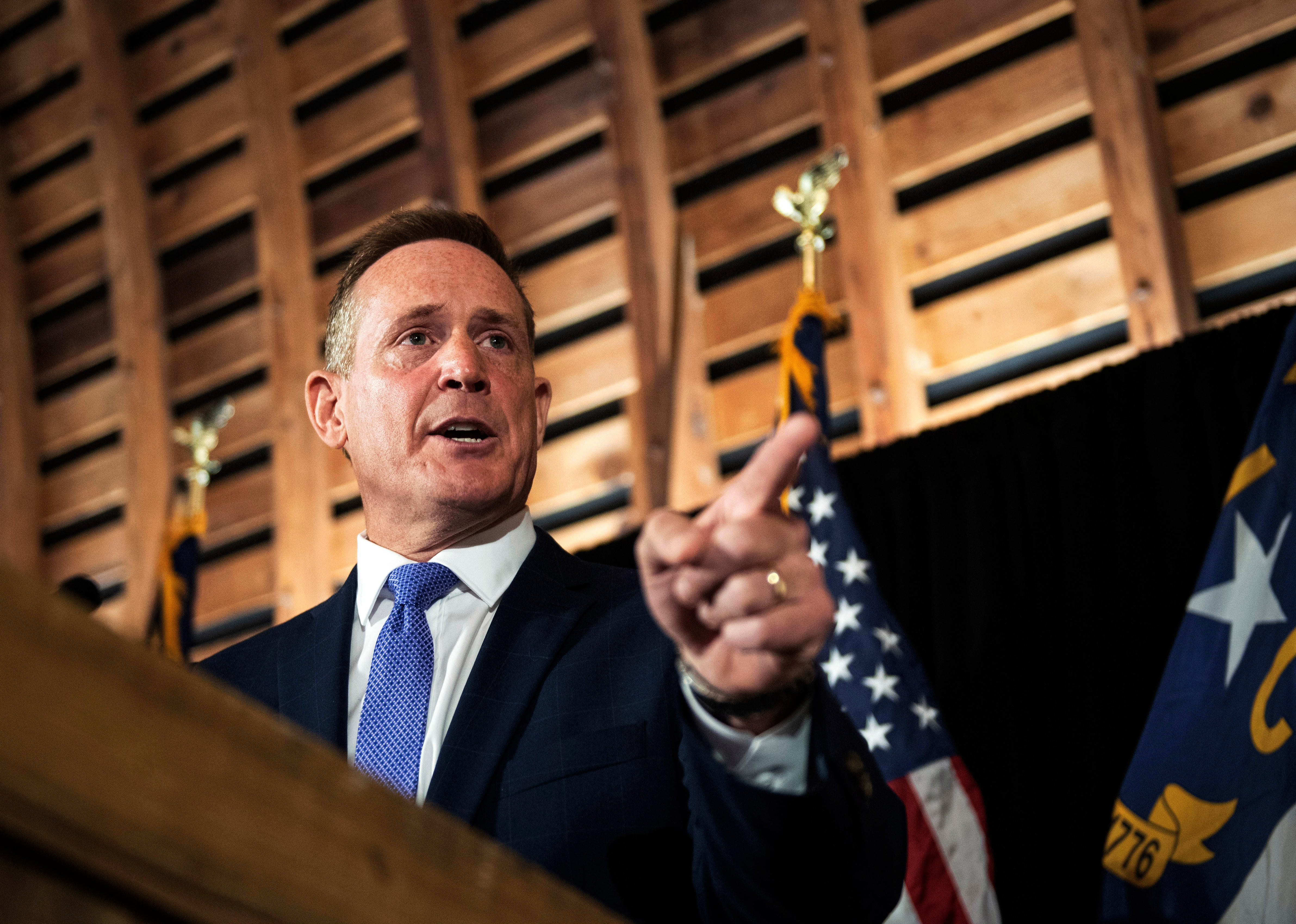
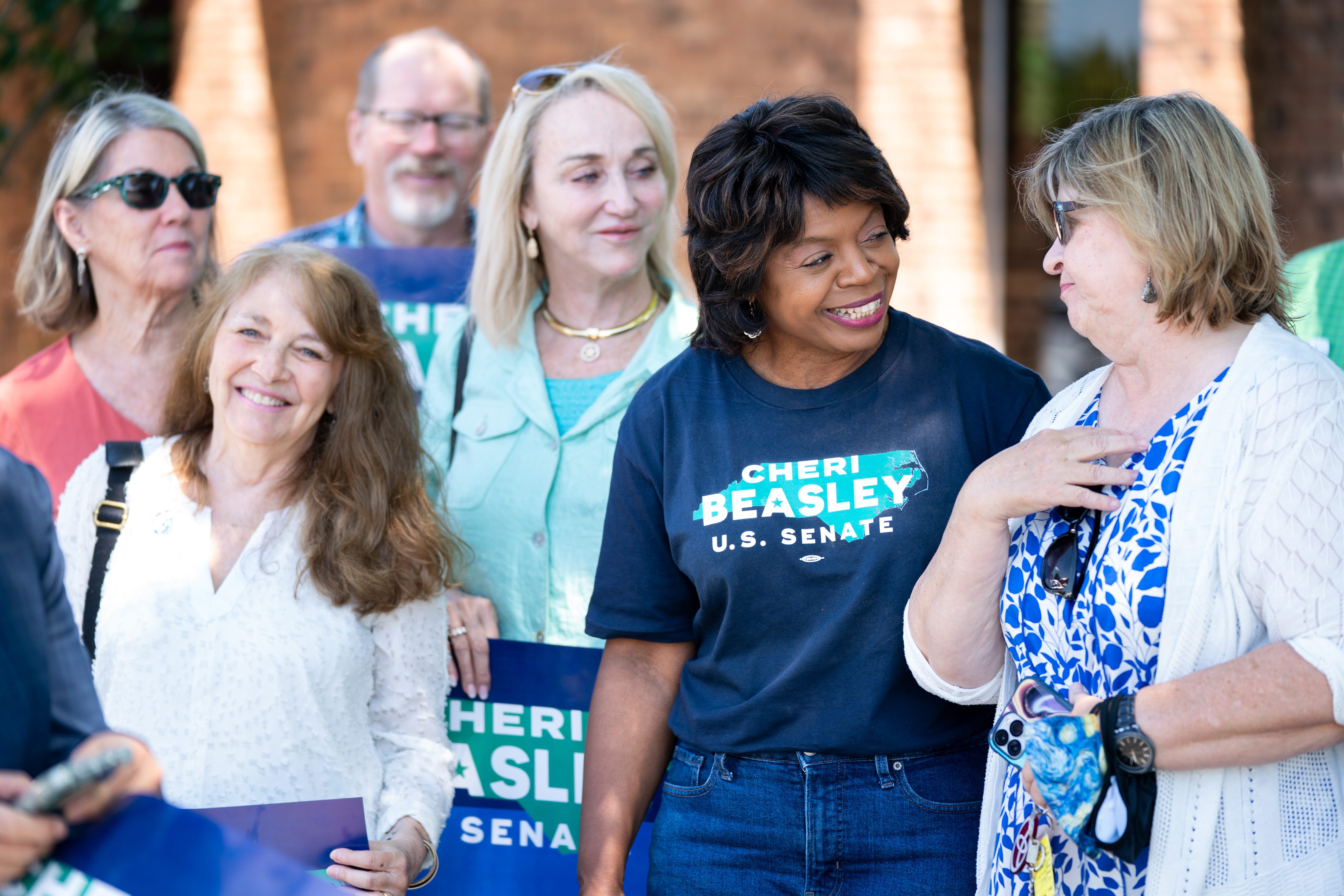
North Carolina Republican Senate candidate Ted Budd is running against Democrat candidate Cheri Beasley, second from right.
North Carolina Republican Senate candidate Ted Budd is running against Democrat candidate Cheri Beasley, second from right.
ALLISON LEE ISLEY, AP; SEAN RAYFORD, GETTY IMAGES
The 56-year-old former chief justice of the North Carolina Supreme Court, who is running against GOP Rep. Ted Budd, said Congress should pass policies welcoming newcomers and keeping communities safe. But she said reforming the immigration system cannot happen until the border is secured.
“But let’s be clear, there are some folks who should not be in this country,” Beasley, looking into the camera, told Tar Heel voters.
Beasley’s opponent, like many GOP candidates this cycle, has leaned almost exclusively into pushing for a tougher policy approach in terms of immigration.
“Border Security is one of the top issues voters bring up on the campaign trail behind skyrocketing inflation,” Budd said at an Oct. 19 campaign event.
The Budd campaign’s website says he wants more funding for Border Patrol agents, increased criminal penalties for those who re-enter the U.S. illegally and completion of a wall along the U.S.-Mexico border.
Over the summer and this fall he’s run multiple ads that mention immigration and criticize the Biden administration for the “wide open border.”

Polling shows immigration is a hot-button topic more for conservative-leaning voters, who argue a porous border is a national security threat and that undocumented immigrants represent a drain on social services.
“If you don’t have a border, I don’t believe that you have a country,” Republican Chris Kuppler, who lives in Charlotte, told USA TODAY.
The 38-year-old surgeon said the farming and agriculture industry are a backbone of North Carolina’s economy, and it makes sense to allow temporary visas for migrant workers who flock to the state for that type of labor.
However, he said any process that allows immigrants into the U.S. should follow strict rules.
“I am more than more than happy for them to come in and apply for citizenship like everyone else, but not happy to just give a free pass to come in for that,” Kuppler said.
But Democrat James Caballero, a 56-year-old IT specialist who lives in Sanford, said it’s hypocritical for people to be stringently anti-immigration while benefiting from migrant’s labor.
“They don’t want the immigrants in but they sure do want them to go out in their fields and pick the crops or go into the kitchens and wash the dishes or whatever that the average American Joe does not want to do,” he said.
Caballero, whose mother immigrated to the U.S. from Mexico, said he’s planning to vote this fall, but what’s happening at the southern border isn’t a “motivating factor” for him.
Other voters, such as independent Geraldine Price, a 60-year-old retired postal worker who lives in Rocky Mount, said immigration is “near the bottom” of her concerns.
Price said protecting abortion rights is something she’s more concerned about, but added that TV ads calling for stricter immigration rules seemed to be about stoking racial prejudice.
“The average American wants that border straightened out,” she said. “They’re tearing up families. Just give them a chance. They’re not coming here to overthrow the government like our former president.”






